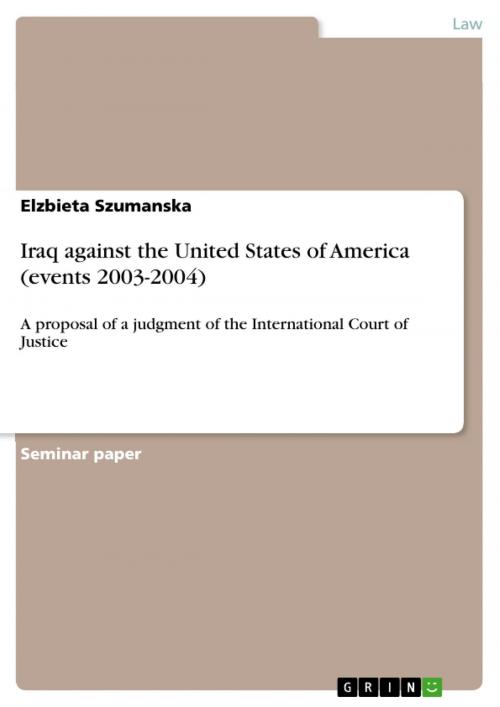Iraq against the United States of America (events 2003-2004)
A proposal of a judgment of the International Court of Justice
Nonfiction, Reference & Language, Law, International| Author: | Elzbieta Szumanska | ISBN: | 9783640192816 |
| Publisher: | GRIN Publishing | Publication: | October 21, 2008 |
| Imprint: | GRIN Publishing | Language: | English |
| Author: | Elzbieta Szumanska |
| ISBN: | 9783640192816 |
| Publisher: | GRIN Publishing |
| Publication: | October 21, 2008 |
| Imprint: | GRIN Publishing |
| Language: | English |
Seminar paper from the year 2008 in the subject Law - European and International Law, Intellectual Properties, grade: 1,0, European University Viadrina Frankfurt (Oder), course: International Judicial System, 64 entries in the bibliography, language: English, abstract: In order to understand the 'Second Iraq War', to follow argumentation of both sides and to deliver an appropriate judgment, firstly it is necessary to prove historical facts that have shaped given situation. Saddam Hussein came formally to power in July 1979 as a President and Chairman of the Revolutionary Command Council. Hussein had the absolute power in Iraq and His control of the military and all state institutions was beyond question. Under his leadership Iraq has never been a democratic, peaceful state: systematically violated laws and human rights, mass killings, tortures and political imprisonment led to a crisis which has become a subject of the dispute on international stage till nowadays. One of the conflicts, Hussein was involved in, was the war with Iran 1980-1988 for the control over the waterway Shatt al-Arab. This warfare has grown from a much wider background: Kurdish and Shiites problem, religious conflict, personal enmity between Hussein and Ayatollah Komeini and Iraq's gain to replace Iran's leading position in the Arab world. As a result of the conflict, where chemical and biological weapons were used, died and were wounded hundreds thousands of people The next aggressive step of Hussein's government was the invasion of Kuwait in August 1990 behind an accusation that the state is stealing oil from Rumailah Fields and establishes military bases within the Iraqi territory. An immediate reaction on the attack resulted in international1 demanding of withdrawal of the Iraqi army from Kuwait by issuing several resolutions2 against Iraq. When Saddam Hussein refused to fulfill their obligations the United Nations Security Council put economic sanctions on Iraq (THE SC RESOLUTION 661). In September 1990 the Security Council authorized United Nations Member States cooperating with Kuwait government 'to use necessary means to uphold and implement Resolution 660 and all subsequent relevant resolutions' in order to restore peace (THE SC RESOLUTION 678). Hussein refused to accomplish also this obligation and only the military operation 'Dessert Storm' brought the war between Iraq and Kuwait to the end (historyguy.com). [...]
Seminar paper from the year 2008 in the subject Law - European and International Law, Intellectual Properties, grade: 1,0, European University Viadrina Frankfurt (Oder), course: International Judicial System, 64 entries in the bibliography, language: English, abstract: In order to understand the 'Second Iraq War', to follow argumentation of both sides and to deliver an appropriate judgment, firstly it is necessary to prove historical facts that have shaped given situation. Saddam Hussein came formally to power in July 1979 as a President and Chairman of the Revolutionary Command Council. Hussein had the absolute power in Iraq and His control of the military and all state institutions was beyond question. Under his leadership Iraq has never been a democratic, peaceful state: systematically violated laws and human rights, mass killings, tortures and political imprisonment led to a crisis which has become a subject of the dispute on international stage till nowadays. One of the conflicts, Hussein was involved in, was the war with Iran 1980-1988 for the control over the waterway Shatt al-Arab. This warfare has grown from a much wider background: Kurdish and Shiites problem, religious conflict, personal enmity between Hussein and Ayatollah Komeini and Iraq's gain to replace Iran's leading position in the Arab world. As a result of the conflict, where chemical and biological weapons were used, died and were wounded hundreds thousands of people The next aggressive step of Hussein's government was the invasion of Kuwait in August 1990 behind an accusation that the state is stealing oil from Rumailah Fields and establishes military bases within the Iraqi territory. An immediate reaction on the attack resulted in international1 demanding of withdrawal of the Iraqi army from Kuwait by issuing several resolutions2 against Iraq. When Saddam Hussein refused to fulfill their obligations the United Nations Security Council put economic sanctions on Iraq (THE SC RESOLUTION 661). In September 1990 the Security Council authorized United Nations Member States cooperating with Kuwait government 'to use necessary means to uphold and implement Resolution 660 and all subsequent relevant resolutions' in order to restore peace (THE SC RESOLUTION 678). Hussein refused to accomplish also this obligation and only the military operation 'Dessert Storm' brought the war between Iraq and Kuwait to the end (historyguy.com). [...]















